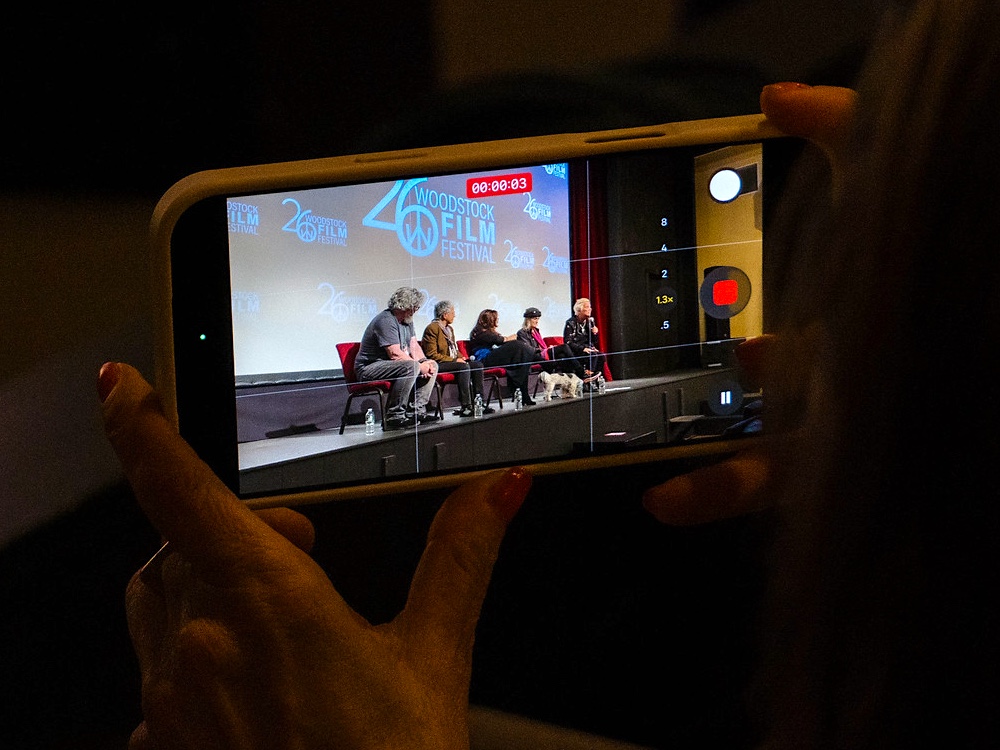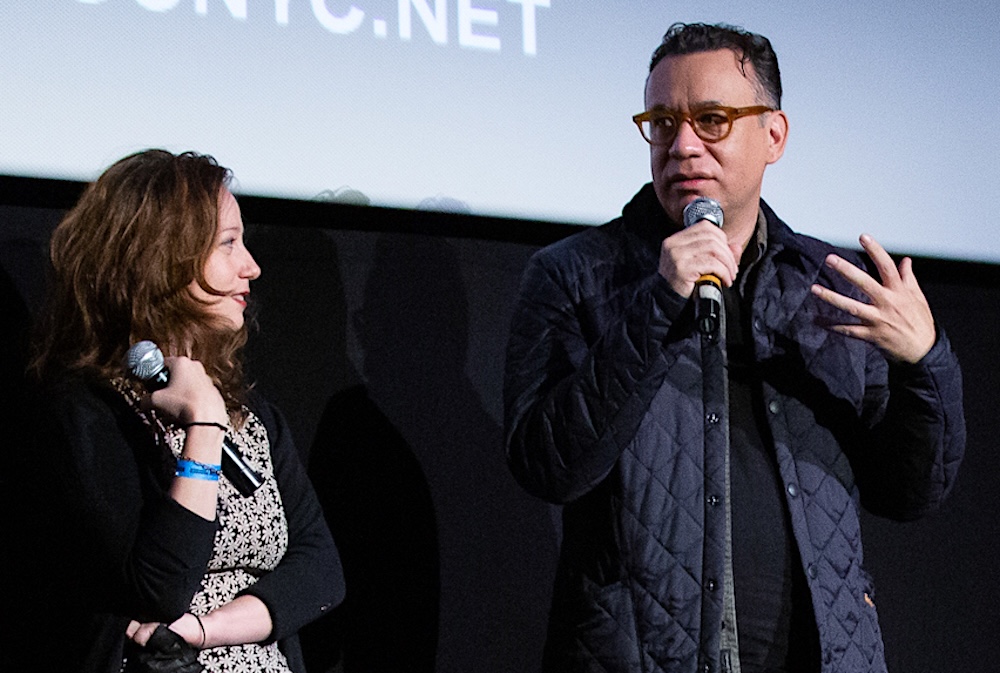
2024 Woodstock Film Festival: A Conversation with Filmmaker Heidi Levitt
In celebration of the 25th Annual Woodstock Film Festival, INSIDE+OUT Upstate NY is pleased to present a series of exclusive interviews showcasing the filmmakers in this year’s festival. Today, we shine a spotlight on casting-director, and now director and writer, Heidi Levitt to talk about her documentary film, Walk with Me, a powerful, personal journey about Heidi and her husband Charlie Hess, as they learn to live with his Early-Onset Alzheimer’s disease.
Heidi makes her debut as a film director with this heartfelt film, motivated by the fact that she “felt there was so much stigma around dementia. It is a silent pandemic, and people don’t understand how to talk about it and how to be inclusive.” The film tracks their journey together as they traverse the US, redefining how life can be lived to its fullest no matter what. Charlie’s charm, warmth, and appeal take center stage, illuminating a true story of love. You can see this inspiring film at the upcoming Woodstock Film Festival and follow Heidi Levitt’s journey and film on Instagram: @walkwithmedoc.
Now in its 25th year, 2024 promises to be as exciting as ever! | October 15 to October 20, 2024
Check out the 2024 Woodstock Film Festival Schedule | Get Your Tickets HERE.
In the meantime, read our Exclusive Interview to learn more about Heidi Levit and her beautiful film below….
INSIDE+OUT: Congratulations on your inclusion in the Woodstock Film Festival. What does it mean for you to be included in this festival and how often do you participate in festivals?
Heidi Levitt: I am honored to be on the 25th anniversary of the Woodstock Film Festival, which launched so many great directors and films and has a rich history in supporting documentaries. As a casting director, I have participated in many film festivals over the last twenty-five years, and it has been great to support the films I cast and produced. But this is my first time as a director, and it will be a very different experience because this is my vision and my voice, and I have made a very personal story. As the indie film industry continues to transform, I think film festivals are more than platforms today. The festival is where we can see our films with an audience and on a big screen, and I feel the interaction and agency that it brings to us as artists make the festival experience something very special.
What is the importance of film festivals to you and your work?
It is so tough to find theatrical distribution in 2024. The festival becomes your first distributor and sets the tone for the life of the film. The festival is the test screening with real feedback. Festivals will play a bigger role as we continue to reframe our industry, and they are so important in bringing audiences and filmmakers together. I come from the live theater, so I really believe in the audience experience in helping define the work.
While filming this documentary, what have you learned about how dementia is perceived in American culture compared to cultures around the world?
I made this film because I felt there was so much stigma around dementia. It is a silent pandemic, and people don’t understand how to talk about it and how to be inclusive. The American model is to build memory care units and separate those whose memories are intact from those who aren’t. I believe we need to build inclusive societies where we can recognize and empathize with people who live and think differently. In Europe, there are more communities where people can be supported while living with dementia. In Columbia, where there is a large number of people who have a gene that causes early onset Alzheimer’s disease, families support their relatives at home. The culture is built around this expectation. Dementia is global and I hope our film will show people what it is like to live with this and keep living by adjusting your life to the disease rather than allowing it to define you. It is a slow and progressive disease, and the disease should not become the label for the person and force everything to stop. People can often live a different kind of life for a longer time than they had led, but it is still one of purpose. Most importantly, we must recognize that no one story exists, and everyone shows their disease differently.
Did you find that there are unexpected gifts that come from taking care of dementia patients?
I don’t think there are silver linings in this, but it does allow you to stop and be present because the present is what you have. Slowing down and mindfulness go hand in hand, and that is just a better way to navigate caring for someone and allow the care partner to slow down. Dementia doesn’t happen to one person; it happens to a family and community. We all need to realize we are in this together, mainly because the disease affects so many, and the likelihood of having dementia touch you is very high. Over 55 million people around the world have Alzheimer’s disease, and many more with other forms of dementia, the umbrella term. There is no cure, and truly, pharma is selling hope, though I believe we are on the cusp of progress!
What are some tools we can walk away with as an audience today to destigmatize ideas around dementia?
We all need to do better at listening and allowing people to talk at their own pace. I hope audiences will see in our film that Charlie looks OK even when he is not OK. This is the truth, and he needs extra help to navigate life. But if you give him that help, he will find his way back. It is up to the people he interacts with to take that extra beat and allow for neuro divergence. We all have challenges. Every person with dementia will have their challenges and symptoms. Simply put, everyone is a snowflake. And because we all learn from an early age how to mask our problems, especially problems with mental health, it is hard for people to see and accept people with problems they can not see outwardly. It is important to destigmatize what it looks like to have dementia and meet people where they are on the neurodivergent spectrum.
In what ways can we, as a collective, work to uplift caregivers in our community?
You need to check on your friends who are caregivers and not wait for them to ask for help. Even a simple call or just saying to them, “Hang in there,” is all they need. It is a tough and lonely road for caregivers, and as a society, we are trained to give help if asked for it. However, caregivers are doers and don’t want to expend extra energy asking their best friends for help. When you are dealing with a progressive degenerative disease that has no answers, it is tough for people on the outside to understand the day-to-day. So I say, like Nike, “Just do it.” Show up and offer them a break. Turn off the texting and actually call someone. A voice or word of encouragement can be so comforting.


What was the biggest challenge in making this film?
Finding financial support was always hard, but I felt emboldened by the quest to make this happen. I have worked in film for over thirty years, and I needed to make this film to cope with what was happening to us and to use my experience as a filmmaker to raise my voice for the millions who are in my shoes and don’t have the access I do to make a film that can reach millions.
Any great surprises making the film?
I married a great leading man in Charlie, and I never knew he would have the screen presence he has. I am a casting director who loves actors and loves to discover talent. Charlie is a friendly guy and designer, and never someone who has liked to be in front of the camera. Yet somehow, his screen presence just clicked.
Want to share about any upcoming projects?
My dream project is an anthology series called EXILES ON MAIN STREET, which I have been working on with my executive producer, Alex Gibney. It is a series of one-hour dramas based on short stories by immigrant writers in America. I have collected over 80 stories by our greatest authors that truly define what it means to be an American. The stories are all character-driven and ethnically diverse, and each story gives voice to a different corner of the country. The common experience of being American binds the series.
I am also going to be remaking a film I wrote the story for and produced in 2001 called DELIVERING MILO. The film is about a boy who is afraid to be born and his mother, who is fearful of bringing a child into this world right now. The film from 2001 could not be more important or relevant today. I think it’s a classic story like It’s A Wonderful Life that will lift our spirits and give us hope that life is worth the challenges we face, even in 2024.

+ + +
About Heidi Levitt
Heidi Levitt has cast films from the Academy Award-winning Best Picture The Artist to movies for acclaimed directors, including Oliver Stone, Wayne Wang, Sally Potter, and Wim Wenders. She also executive produces films with directors she casts for. Recent credits include Victor Nunez’s film Rachel Hendrix starring Lori Singer, and Wayne Wang’s Coming Home Again, starring Justin Chon. She is a proud graduate of Barnard College and The American Film Institute, where she is a senior lecturer in Directing. Heidi has won four Artios Awards for excellence in casting and is a member of the Academy of Motion Picture Arts and Sciences.
About the Woodstock Film Festival

Founded in 2000, the Woodstock Film Festival (WFF) is a not-for-profit 501(c)(3) organization that nurtures and supports emerging and established filmmakers, sharing their creative voices through an annual festival and year-round programming to promote culture, diversity, community, educational opportunities, and economic growth.
WFF provides innovative mentoring and inspired educational programs benefitting filmmakers, students, and diverse audiences while serving as a powerful cultural and economic engine for New York’s Hudson Valley and beyond. Such efforts have consistently resulted in the festival being hailed as one of the top regional film festivals worldwide. The Woodstock Film Festival is an Oscar®-qualifying festival in the short film categories – Live Action Short Film, Animated Short Film, and Documentary Short Film.
+ + +
Now in its 25th year, 2024 promises to be as exciting as ever! 2024 Lineup and Tickets HERE.
Full and Weekend Festival Passes are available – Get Your Festival Deluxe Passes HERE
Here is a link to the 2024 Film Festival Schedule
Write a Comment
You must be logged in to post a comment.








